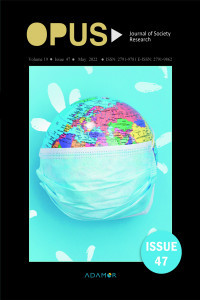15 Temmuz Darbe Bildirisinin Sosyo-Politik Analizi
Kuvvetler ayrılığına dayalı demokratik bir hukuk devleti olan Türkiye, demokrasi tarihi boyunca doğrudan veya dolaylı olarak farklı askeri müdahalelere maruz kalmış ve bu durum siyasal süreci derinden etkilemiştir. Askeri müdahalelerin sonuncusu ise 15 Temmuz 2016 yılında yaşanmıştır. Bu darbe girişimi, diğer askeri müdahalelerden bir çok açıdan farklı olmakla beraber bazı yönleriyle 27 Mayıs 1960 darbesini hatırlatmaktadır. Askeri müdahale sürecinde darbe bildirileri kaleme alınmış ve kamuoyu ile paylaşılmıştır. Darbe bildirileri topluma verilen ilk mesajlar olması sebebiyle özenle hazırlanan ve düne, bugüne ve yarına dair topluma açıklamalarda bulunan metinlerdir. Her askeri müdahalede olduğu gibi bu darbe girişiminde de gelenek haline gelen ve darbenin gerekçesi, amacı ve mesajlarını içeren darbe bildirisi, TRT ekranlarından okunmuştur. Bu çalışmada yöntem olarak darbe bildirisi üzerinden sosyo-politik bir okuma yapılmaktadır. Çalışmada, bildiri metni üzerinden hareketle, darbecilerin kamuoyu desteğini almak veya toplumu ikna etmeye yönelik çabalarını sosyolojik ve siyasal açıdan değerlendirmek amaçlanmaktadır. Böylelikle, 15 Temmuz darbe girişimi farklı açıdan değerlendirilmektedir.
The Socio-Political Analysis of The July 15 Coup Declaration
Turkey, which is a democratic state of law based on separation of powers, has been subjected to different military interventions directly or indirectly throughout the history of democracy and this has deeply affected the political process. The last of these military interventions took place on 15 July 2016. This coup attempt is different in many respects from other military interventions. However, it reminds me of the 27 May 1960 coup with some aspects. Coup declaration were written and shared with the public during the military intervention process. Coup declarations are texts prepared carefully because they are the first messages given to the society. This messages, given to the society, encloses statements about yesterday, today and tomorrow. The coup declarations, which has become a tradition as in every military intervention, and which contains the reason, purpose and messages of the coup, has been read from TRT screens. The method of this study is to make a socio-political reading on the coup declaration. In this study, it is aimed to evaluate the efforts of the coupists to get public support or to convince society from a sociological and political point of view. Thus, the July 15 coup attempt is evaluated from a different perspective.
Keywords:
July 15, Coup, Guardianship, Declaration, Democracy,
___
- AA, (2016). FETO’s coup attempt minute-by-minute, Istanbul: Mega Press, 06/10/2018 tarihinde https://www.aa.com.tr/uploads/TempUserFiles/pdf%2Fkitap_yeni.pdf adresinden erişilmiştir.
- Alkan, H. (2016). Understanding july 15: Parameters and conse-quences, BİLİG, 79, 253-272.
- Akıncı, A. (2018). A general overview on 15 july: From military tutelage to FETO tutelage, Kahramanmaraş Sütçü İmam University Social Seciences Journal, 15, 105-122.
- Bayhan, V. (2014). New social movements and Gezi Park resistance, Birey ve Toplum, 4(7), 23-57.
- Castells, M. (2015). Rebellion and hope networks social movements in the age of the internet, İstanbul: Koç University Publication.
- Çağlar, İ. Memmi, A. M. and Altun, F. (2017), Media on july 15: Coup and course of resistance, Ankara: SETA.
- Demir, S. T. and Çağlar, İ. (2017). Communication strategy of FETÖ and 15 july coup attempt, Ankara:SETA
- Devran, Y. and Özcan, Ö. F. (2016). July 15 coup attempt: The usage of traditional and new communication technologies, AJIT-e: Online Academic Journal of Informatıon Technology, 7(25), 71-91.
- Genç, F. N. (2017). Military interventions and crisis management in Turkey, Turkish Studies, 12(16), 219-240.
- Goodpaster, A. J. and Huntington, S. P. (1977). Civil-military relations. Washington D.C: University of Nebraska Press
- Huntington, S. P. (1973). Political order in changing societies. New Haven: Yale University Press.
- Karaaslan Faruk (2016). July 15th coup attempt and the Turkey context of conservatism:Rethinking conservatism in Turkey, The Journal of Conservative Toughts, 13(49), 21-35.
- Lim, M. (2012). Clicks, cabs, and coffee houses: Social Media and oppositional movements in Egypt, 2004–2011. Journal of Communication, 231-248.
- Miş, N., Gülener, S., Coşkun, İ., Duran, H. and Ayvaz, E. M. (2016). Democracy watches: July 15 coup attempt in social perception, Ankara: SETA.
- Sungur, A. S. (2017). Role of socıal medıa ın quashing the coup at-tempt dated july 15, ASOS Journal, 5(47), 597-612.
- Yayın Aralığı: Yılda 6 Sayı
- Başlangıç: 2011
- Yayıncı: ADAMOR Toplum Araştırmaları Merkezi
Sayıdaki Diğer Makaleler
Küresel Çağ Tartışmaları Altında Milliyetçiliğe Yeniden Bakmak: Yeni Osmanlıcılık Söyleminin İnşası
Dilan ÇİFTÇİ, Fuat Boğaç EVREN
Dansa Yönelik Tutum Ölçeği Geliştirme Çalışması
Nilay BAŞOK, Gül COŞKUN DEĞİRMEN, Miraç Pınar Mert
İlaç Sektöründe Tükenmişlik Sendromu ve Satış Performansı Arasındaki İlişki
M. Çağrı PEHLİVANOĞLU, Mustafa Emre CİVELEK
Ercan KAÇMAZ, Büşra FİGENKAPLAN
Suriyeli Sığınmacıların Türkiye’ye Göç Sonrası Yaşadığı Sorunlar: İstanbul Örneği
Güler GÜNEŞ ASLAN, Fethi GÜNGÖR
Gül Esra ATALAY, Bahar MURATOĞLU PEHLİVAN
Ahmet ÇETİN, Seher CEYLAN, Nuray Selma ÖZDİPÇİNER
Moda Tasarımı Öğrencilerinin Giyim Markalarına Yönelik Görüşleri: Giresun Üniversitesi Örneği
